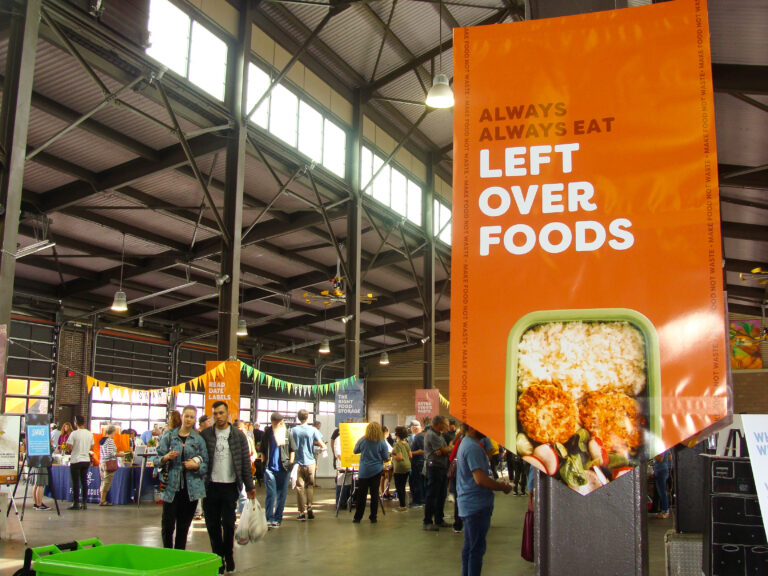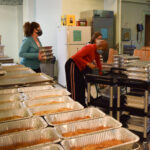
- Kim Kisner
- Community
- 10/18/2022
Make Food Not Waste is an Organization Focused on Preventing Food from Going into Landfills

Americans throw away 40% of the food we grow, and most of that waste occurs in our homes and consumer-facing businesses including restaurants. Households make up 37% of wasted food, and consumer-facing businesses account for 28%.
Make Food Not Waste is an organization focused on decreasing this. Founded in 2017 by Danielle Todd, Make Food Not Waste is at heart an environmental organization whose impetus is twofold – first to prevent food from going into landfills to help save the climate, and second to make use of this food by feeding people who need it.
With the original mission of teaching the community about sustainable food practices to reduce the amount of waste, MFNW hosted two community feasts in 2018 and 2019. Welcoming over 2,500 and 3,500 people respectively, the events were a way for people to sample dishes made by chefs from food that would have gone into landfills – from the likes of Metro Detroit’s Mabel Gray, Selden Standard, and others.
From the start, the organization has worked alongside Food Rescue U.S. – Detroit to collect food waste from area restaurants, farmers, and stores that would otherwise have gone to waste and disseminate it to those in need.
Said Darraugh Collins, site director for Food Rescue U.S. – Detroit, “Even one meal that may have otherwise not been had makes a difference.”

In 2021, MFNW opened its Upcycling Kitchen in Jefferson Avenue Presbyterian Church, run by chef Ederique Goudia.
“With our partners, we work to serve nutritious complete meals to over 1,000 community members weekly, and also host a food pantry with fresh produce, pantry items, dairy, eggs, and more using food that would otherwise be discarded,” said Kate Morgan, communications director of Make Food Not Waste.
To date, they have upcycled about 76,000 pounds of food and served over 85,500 free meals to the community.
This year, through a grant from the Environmental Protection Agency, MFNW has brought an international third-party certification program and launched The PLEDGE on Food Waste in Detroit. This program teaches restaurants, hotels, and other food service businesses in tactics to reduce food waste.
In partnership with Food Rescue U.S.-Detroit, Make Food Not Waste is the first organization in the U.S. to offer this program, putting the city at the forefront of sustainability in the food service industry.
“We work to run a zero-waste kitchen, and putting these protocols in place helps us measure potential waste and mitigate it, which is extremely important to us, to the community, and the climate,” said Omar Anani, owner of Moroccan bistro, Saffron De Twah, located on the east side of Detroit.

Along with Saffron De Twah, 23 Detroit-area food purveyors have joined The PLEDGE and Todd aims to increase this to 30+ by the end of the year.
Restaurants involved, pledge to shrink their carbon footprint, cut food costs, build their brand, and give back to the community.
“Anyone who utilizes resources has a responsibility to replenish them, and restaurants use a lot of resources,” said Stephanie Yeatts, director of social impact and sustainability for Founders Brewing Co. “At the same time working with and for our community to support local folks is vital to our livelihood. So we are taking The PLEDGE and piloting it in our Detroit taproom to then replicate in our other facilities.”
Said Alessandra Carreon, who co-owns Southwest Detroit’s PizzaPlex with her husband, “As a business we’ve always been committed to sustainability – trying to improve the environment and engage with the community are things we are inherently passionate about. When we began talking to Todd The PLEDGE certification just fully aligned with our mission and values and provided the structure to think and act more deeply in the restaurant around food waste.”
Restaurants are expected to save 3% to 5% in food costs by implementing The PLEDGE, where they commit not only to tracking their food waste but to following a series of reduction tactics in purchasing, storage, plating, knife skills, staff training, among others.

“A lot of restaurants are doing great work in the area of food waste and sustainability,” says Todd. “These restaurants are putting Detroit on the map by adopting these efforts.”
Collins points out that under the Bill Emerson Good Samaritan Food Donation Act, restaurants are protected when donating food in good faith, so there is no barrier to sharing resources and reducing food waste. She says, “There is currently an amendment before Congress to increase protection even further.”
Anani sums it up by saying, “Restaurants feed so many people and are such a huge part of the food system, it’s time for us to tighten up our practices and be part of the solution versus the problem. This starts with us.”
Be sure to subscribe to our newsletter for regular updates on sustainable business practices in and around Detroit.
Kim Kisner
- All
- Business
- Community
- Education
- Events

Unique Monique Scented Candles, a Detroit-based business founded by Monique Bounds., aims to produce candles and household products with clean ingredients and local supply chains. What began as a personal hobby during college has evolved into a full-time venture producing coconut oil and soy-based candles made with essential oils and locally sourced materials. SBN Detroit interviewed Bounds about launching a sustainable product line, sourcing challenges in Michigan, and...

Eastern Market Partnership, in collaboration with the City of Detroit’s Office of Sustainability Urban Agriculture Division, has announced $240,000 in grant funding to support Detroit-based farmers and farmer collectives. The grants will advance food access, climate education, sustainable land use, and economic opportunity, with priority given to Black- and Indigenous-led farms, youth-led initiatives, and projects rooted in historically disinvested neighborhoods. The recipients – ranging from cooperatives and community...

Citizen Robotics is a Detroit-based nonprofit that advances the use of robotics and digital manufacturing in residential construction, focusing on improving productivity, sustainability, and long-term affordability. Best known for its early work in 3D-printed housing, it explores how alternative construction methods and new financial models can reduce material waste, lower lifetime operating costs, and enhance the resilience of homes. SBN Detroit interviewed Tom Woodman, founder and president of...







